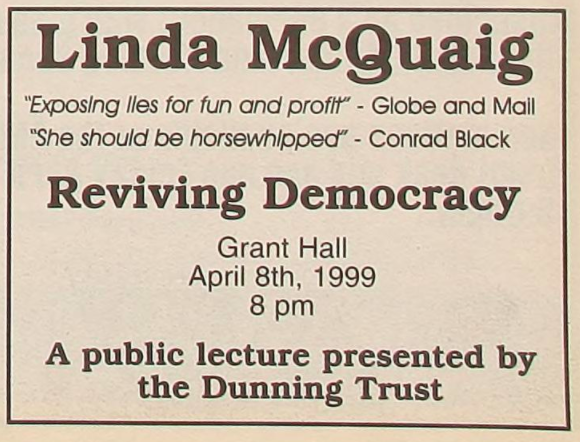
Linda McQuaig is an activist, journalist, and author described by the National Post as “Canada’s Michael Moore.” She is the author of numerous books that challenge free-market economic ideology and call for a more egalitarian distribution of wealth and power. These include Behind Closed Doors (1987), which examines the history of the fight over tax policy in Canada, as well as Shooting the Hippo (1995) and The Cult of Impotence (1998). In 2017, Shooting the Hippo was selected by the Literary Review of Canada as one of the 25 most influential Canadian books of the past 25 years. More recently, she has published In the Sport & Prey of Capitalists: How the Rich are Stealing Canada’s Public Wealth (2019), which explores privatization as a pervasive and destructive force in Canada. After attending the University of Toronto, McQuaig was hired by the Globe and Mail in 1974. A few years later, she began working for CBC Radio’s As It Happens, and in 1979 went to Tehran to freelance for Canadian media outlets including the CBC and the Globe and Mail to cover the aftermath of the Iranian revolution. In 1991, she was awarded an Atkinson Fellow in Public Policy fellowship to study the welfare systems in Europe and North America. Since 1992, McQuaig has written an op-ed column in the Toronto Star.
McQuaig opened her lecture with the question “what choices do we, as citizens, have in the massive global economy? Can we still have a society that defends the public good, a society focused on promoting the well-being of the whole community?” While Canadian society was increasingly organized around the principles of the marketplace, she argued that most Canadians disapproved of this, only reluctantly accepting it because they believed there was no alternative. She labelled this a “cult of impotence,” in which the weakening of democracy and transfer of power from popularly elected governments to powerful private interests is celebrated. The central myth underpinning this was that the Canadian government could not do anything in the global economy. But, McQuaig stated, to the extent that governments were constrained at all, it was because they chose to cede power to financial markets. This power could be reclaimed, and Canadians could decide what kind of global economy they wanted to participate in. The obstacles to “good globalization” were not technological, but merely political. In overcoming the resistance of the financial elite, she concluded, Canada would become a more egalitarian society.
Listen to a portion of her lecture below.